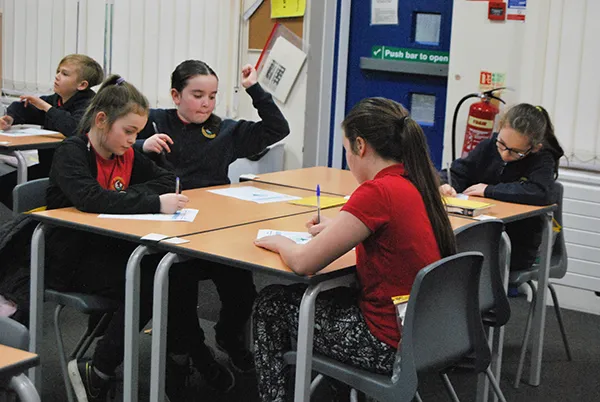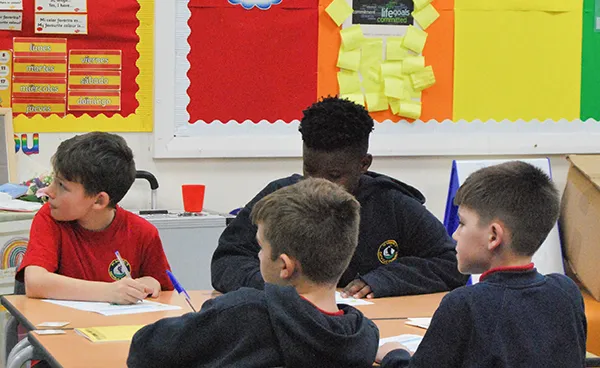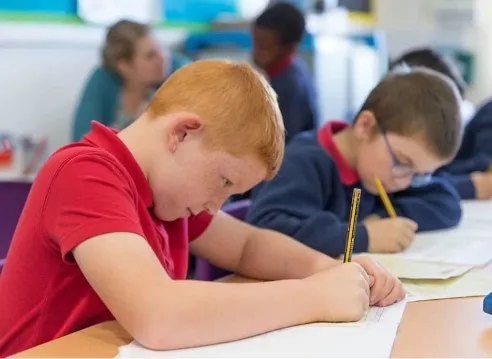Home / Curriculum / English
At St Gabriel’s Catholic Primary School, it is our intent for our children to be able to confidently communicate their knowledge, ideas and emotions while developing as fluent, confident and able writers, who can write for purpose, effect and with the audience in mind.


We aim for our children
From the moment children enter our school in Pre-school or Reception, importance is placed on speaking and listening skills, how they use language with imagination and accuracy and develop their ever growing vocabulary. Competence in the four key areas of reading, writing, speaking and listening is encouraged throughout our curriculum in order to enable the children to communicate effectively in all social situations.
In Preschool and Reception, we have our own bespoke curriculum for Literacy. This curriculum is taught through a range of high quality, engaging texts which link to our half termly themes. The Early Years Literacy progression documents outline the key objectives to be taught in each term, across the year. Objectives are carefully selected and sequenced from Preschool to Reception, culminating in the final outcomes of the Early Learning Goals.
From Year 1 upwards, writing is primarily taught during daily English lessons, although further opportunities to apply writing skills are incorporated throughout the curriculum. Units of work follow a writing process that begins with a stimulus; this could be a high quality text, a learning experience, a visitor into school, a visit outside of school or a themed week. The purpose, audience and effect on the reader is at the heart of the writing process for children. Progression through the teaching and learning of the different aspects of writing then proceeds within each unit of work where sequenced lessons ensure that prior learning is checked and built upon and that National Curriculum objectives are taught through a combination of approaches and opportunities:
Reading is taught initially using Read, Write, Inc.; this is a very structured synthetic phonics programme. Read, Write, Inc. is introduced in Pre-School, when the children are ready to access it, and in our Reception class. Phonic skills are then consolidated through Key Stage 1 and into Key Stage 2 as the need arises. Some pupils also undertake specific intervention programmes if they experience difficulties with literacy skills such as: 1:1 RWI, Fresh Start or Sounds Write.
Our children read a wide variety of high quality texts which enables them to develop, appreciate and understand the purpose of writing. A wide range of resources are readily available to enable our children to become independent writers, including dictionaries, thesauruses and working walls.
All children at our school are encouraged to read for pleasure and have access to class libraries, as well as a whole school library, where they can borrow books from. Children are also rewarded for reading activities they complete at home by receiving a ‘golden ticket’ each week. World Book Day is celebrated each year at school. In order to enrich the curriculum, visits with local authors are arranged and themed weeks are celebrated through the use of whole school texts.

The impact of our English curriculum for our children is shown through the progress they make, the confidence they nurture and the skills they develop and transfer across the curriculum. It is our hope that all children will leave St Gabriel’s with the following skills and qualities: having developed a love of reading that will continue with them through life; being able to speak fluently so they can communicate their ideas and opinions to others; reading fluently with good pace and understanding; using a wide range of vocabulary and having the courage to be adventurous in their choices; and having the confidence to write clearly, accurately and coherently, adapting their language and style for a range of contexts, purposes and audiences.



We have now updated our Holidays & Events section of our website for this school year.
Make sure to check it out.
Performance Measures